Page Content
This past summer, 10 Alberta teachers participated in Project Overseas. Here is a sampling of first-person accounts of their experiences.
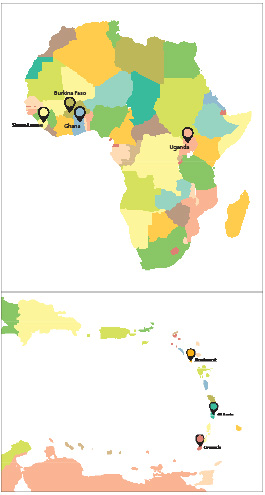
What is Project Overseas?
A joint endeavour by the Canadian Teachers’ Federation (CTF) and its member organizations, Project Overseas provides professional assistance to fellow teachers in developing countries. The project takes place during the months of July and August.
Started in 1962 with one program in Nigeria, Project Overseas has helped teacher organizations in more than 50 countries in Africa, Asia, the Caribbean and the South Pacific. Since its inception, more than 1,800 Canadian teachers have participated in the program. Currently, approximately 50 volunteers are sent each summer to about a dozen countries.
Application deadline approaching
The deadline to apply for Project Overseas this year is midnight on Nov. 1. More information is available on the ATA home page at www.teachers.ab.ca.
Mission is making a difference
Michelle Dickie
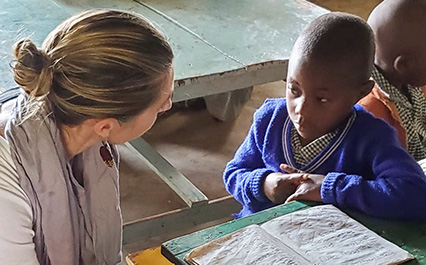
Alberta teacher Michelle Dickie reviews a student’s work during a school visit in Uganda.
It is extremely difficult to briefly put into words the thousands of moments that made up my experience with Project Overseas in Uganda.
Every morning, the road to our site was covered in fog. Through it, the hard-working people of the region would emerge: walking to school, transporting bananas, shepherding livestock, carrying water, starting their day. As we climbed higher and snaked our way through the hills, the lush landscape would reveal itself: fruit plantations, homes and sunlight. It was a beautiful way to start the day.
The teachers that I worked with are professionals living and teaching in situations that most of us can’t imagine. Their daily challenges and successes are ones that I cannot begin to list and certainly put our issues into a new perspective. It was a true honour to work alongside them.
The students who must walk for up to an hour with no shoes to get to school have a different road to travel than our students, but they are being met by teachers who care greatly about their success, and while we may come from very different backgrounds, this is where we were no different from each other. Together, we worked on the areas of literacy, numeracy, instructional leadership, life skills and physical education with the goals of inspiring, validating and improving current practices.
Michelle Dickie teaches at Varsity Acres School in Calgary.
Girls face barriers to education
Ellen Braaten
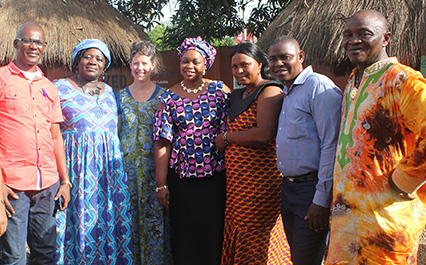
The Teachers Action for Girls team in Sierra Leone.
The experience was extremely valuable for me professionally and personally. I was inspired by the pedagogy, enthusiasm and resilience of my Sierra Leonean colleagues. These are teachers who often have upward of 75 students in a class, who are not predictably or sustainably paid and who do not have the opportunity for any professional development outside of this project, yet they were willing to embrace the experience and operate with skill and professionalism.
I was especially affected by our discussions regarding barriers to girls’ education such as early marriage, teenage pregnancy and significant gender-based violence within educational settings. It was a great privilege to learn from these colleagues, to add my own contribution to the quality of education in the country and to build precious friendships.
I am very grateful for the opportunity to participate in this project and would highly recommend Project Overseas to my Albertan colleagues.
Ellen Braaten teaches in Calgary.
Sierra Leone provides rewarding challenge
Lawrence Hunter
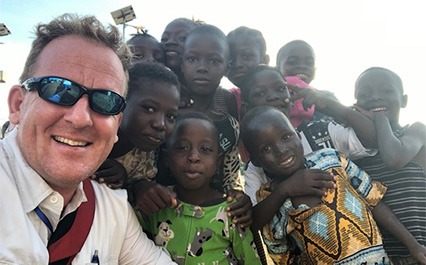
Neighbourhood children greet Lawrence Hunter during his walk to work.
I am a seasoned Project Overseas participant and team leader. In 2016, I travelled to Ghana as a team member, in 2018 as team leader for Ghana-Nkabom, and this year to Sierra Leone as a team leader, which was another amazing opportunity.
Given Sierra Leone’s recent turbulent history, I was uncertain what to expect, but I was quickly inspired by the Leonean teachers. They demonstrate perseverance, high morale and dedication to education in the face of poverty, overcrowded classrooms, severe underfunding and lack of teaching materials, many students working well below grade level, overall poor working conditions and limited salaries. They have faith in education as the solution to ultimately rebuilding and healing their country after years of civil conflict.
Along with three other Canadian teachers and Leonean co-tutors, I participated in a train-the-trainer program. In collaboration with our Leonean co-tutors, we provided peer coaching and team facilitation for workshops in literacy, numeracy, teacher action for girls and peace education for local teachers. This year, the CTF-SLTU efforts doubled from previous years, allowing us to provide workshops for two groups, each of 100 local teachers. The Canadian team focused on guiding and coaching local instructors as they facilitated the workshops.
I worked specifically in peace education. The primary goals were to strategically design classroom cultures that nurtured inclusiveness, acceptance of gender, reduction of violence and aggression, elimination of corporal punishments and the creation of systemic change across Sierra Leone. Engaging in social and educational reform was both challenging and rewarding for me, but as Augustine of Hippo once said, “Each of us had something to learn from the others and something to teach in return.”
Though challenging, this was another extremely rewarding experience with Project Overseas.
Lawrence Hunter teaches at L.Y. Cairns School in Edmonton.
Journey ignites new passion
Lorie Masur
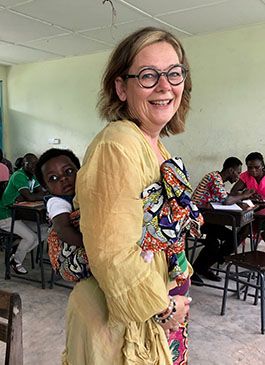
Lorie Masur teaches with an aide provided by one of her colleagues from Ghana.
Leadership, mentorship, culture and adventure — these were some of my eye-opening and life-changing experiences with Project Overseas.
When I reflect on my month-long teaching assignment in Ghana, it is the people who stand out.
We were a team of eight Canadian teachers from across Canada. I was privileged to work, plan and learn with these impassioned people. From day one, we knew our team was strong. It was love at first sight, and we hit the ground running! Hard to believe that over a period of four weeks, these seven master teachers became my new besties and even my family!
Greeting our team once we arrived in Ghana was the Ghana National Teachers Association (GNAT). Ernest and Thomas from GNAT looked after us like we were royalty. Our driver, Eric, immersed us into the culture of Ghana with his music and his stories. In Accra, we planned and bonded with our co-teachers from Ghana.
We taught three professional development sessions that were each a week long. The first session in Takoradi lives in my memory as a rural, go-back-in-history-50-years session. The teachers we were teaching were kind and gentle, with stories and song and colour that spoke to me as an authentic African experience.
The other two sessions took place at Cape Coast College, a local high school of 3,000 with a monkey sanctuary on site! As I shared my lessons, the teachers I was working with shared with me their kind spirit, generosity, colourful culture, and song and dance.
I came back to Canada, to my school and to my family full of appreciation and gratitude, full of a love for Africa, and full of a passion to teach others in a way that I did not have before I left on this adventure.
Lorie Masur teaches at Banting and Best Elementary School in Calgary.
Thinking about applying? Go for it!
Karen Dion
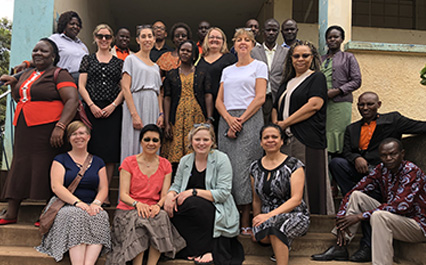
Karen Dion of Alberta (bottom, left) was part of a team of 10 Canadians who visited Uganda to work with leaders of the Ugandan National Teacher’s Union and Ugandan co-tutors.
Imagine teaching a class of more than 60 students in a small room with no electricity, only enough seats for 20, and walls that need to be smeared with cow dung weekly in order to keep the dust down. This is a reality for hundreds of teachers in Uganda. Some rural teachers don’t even have a classroom, only a tree to sit under, while they teach a class of more than 100 pupils.
Despite this, the individuals I met while partaking in Project Overseas were enthusiastic, passionate and thirsty for every bit of advice we were able to give. Not only did they prove their resourcefulness and resiliency time and again, they also made us feel extremely welcome and actively engaged in the sessions we were presenting, even though some of our ideas were considered to be quite “out of the box.”
Concepts such as engaging students through movement and games became a strong focus of our presentations, as did differentiated instruction and levelled learning. In return, I walked away with a new appreciation for the materials and support we receive as teachers in Canada, along with a large number of new strategies and teaching ideas to try in my own classroom.
You cannot help but get swept up by the beautiful music, dancing and art that surround you while in Uganda. At the same time, you discover strengths that you never realized you had. Some highlights of the trip included navigating the busy markets of downtown Kampala, having college students ask me to present some of my ideas during a study break, interacting with the children at a local school, attending cultural performances that were radiant with energy, and being caught in a hail storm while boating on the Nile River.
Without a doubt, this trip was one of the most powerful experiences of my life. I would tell anyone considering applying to go for it. You will not believe how much you will learn and grow.
If you would like to see more pictures of Team Uganda Central and our adventures this summer, you can check out our twitter account @CTFUganda2019.
Karen Dion teaches at Seven Persons School in Seven Persons (south of Medicine Hat).
Apprentissage actif au Burkina Faso
Marie-Eve Allaire
Le 8 juillet dernier, je m’envolais avec mon équipe pour le Burkina Faso. Dans le cadre du Projet outre-mer, nous allions travailler en partenariat avec les syndicats et les professeurs de l’endroit dans le but de donner des formations aux enseignants burkinabés. Nous allions parler entre autres d’inclusion, d’équité des genres et de pédagogie générale. Pour ma part, j’ai travaillé de pair avec les enseignants des SVT (sciences de la vie et de la terre) et d’histoire dans le but de leur fournir de nouvelles idées de jeux et d’activités pour réviser la matière. J’ai aussi donné un atelier sur la ligne du temps qui s’est terminé par une petite compétition pour inciter les participants à créer la ligne du temps la plus complète possible. Les enseignants burkinabés n’ont pas l’habitude d’employer les jeux et les activités de manipulation. Il a fallu beaucoup d’adaptation pour les leur expliquer! L’approche pédagogique employée au Burkina Faso est fortement ancrée dans les méthodes traditionnelles : les enseignants parlent, les élèves notent tout et mémorisent. Cela pose des défis à plusieurs égards. Comme le nombre moyen d’élèves par classe peut se situer autour de cinquante (et même aller jusqu’à cent dans certaines régions, y compris au primaire), il est difficile de faire bouger les élèves. Malgré tout, il était évident que les enseignants burkinabés veulent ce qu’il y a de mieux pour leurs élèves et qu’ils souhaitaient vraiment apprendre de nouvelles stratégies!
Marie-Eve Allaire enseigne les 3e et 4e années à l’école Les Cyprès de Medicine Hat.
Experience sparks imagination and creativity
Marianne Darlet
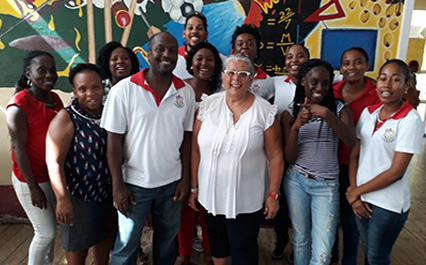
Marianne Darlet with the Grenada teachers numeracy group.
The topic I was asked to cover during my three weeks was numeracy. The first day I walked into my classroom, I saw accordion doors that separated classrooms. There was black paint on three of the doors, which were used as blackboards. There were no windows on one side; instead there was a wall that was latticed so that air could flow freely through the classroom. I introduced myself, and the morning passed quickly as I was inundated with questions about Canada by the 11 teachers attending my workshop.
For the next two weeks we worked together to find strategies and share experiences to improve numeracy on the island. These educators are so resourceful and effective with the little they have in their classrooms that I was humbled by this experience. Imagination and creativity is what we have so much in common as teachers, and that is why Project Overseas is so successful.
The days flew by quickly as we discovered together new ways to teach math. The heat, humidity, birds who sat on the lattice and noise from the courtyard did not hinder the fun we shared while trying new methods of teaching on one another.
Should you want to help my new friends in Grenada, I opened a Facebook account called Grenada Teachers Numeracy Aid for elementary math resources. I know that they would be grateful for any resources posted on this site.
Marianne Darlet teaches at Ecole JH Picard in Edmonton.
Travel overseas brings joy and confirmation
Monique Wilson
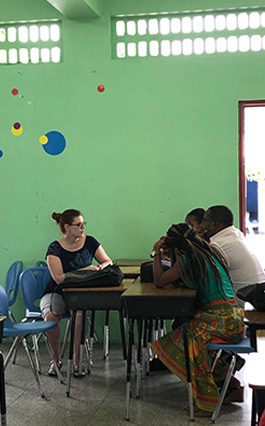
Monique Wilson conducts a collective bargaining session with a group of Lucian teachers.
The heat hits you as soon as you step off the plane. While it was hot in Ottawa (especially compared with Edmonton), it is HOT in St. Lucia … hot and humid.
As someone involved in teacher welfare both at my school and at the ATA through my membership on the Teacher Welfare Services Committee, I was excited to share my love and knowledge of teacher welfare and collective bargaining over 10 days in Castries, with teachers from all over the island.
St. Lucia is a tiny island — the whole island is smaller than the city of Calgary — with approximately 2,000 teachers working there. Many of them made a significant drive of an hour or more one way to voluntarily attend the conference, even after four days of Carnival celebrations, which included parties that lasted all night!
Team St. Lucia comprised me and three other female teachers from across Canada. It was so great to spend time with these amazing teachers, both by video conference and at orientation in Ottawa, before departing for St. Lucia. Working with these teachers and with the staff in St. Lucia was a privilege and a joy, and it was so amazing to confirm the idea that regardless of environments, circumstances or size of education system, teachers all over the world have the same triumphs, challenges, joys and heartbreaks.
I returned to Canada grateful for a strong teachers’ association, happy to have made new friends both at home and overseas, and excited to take on a new school year!
Monique Wilson teaches at Aurora Charter School in Edmonton.
Intégration des technologies dans l’ombre du volcan
Shawn Arseneault
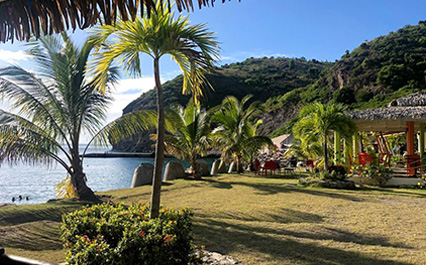
Un paysage spectaculaire de l’ile.
Mon équipe s’est déplacée dans les Caraïbes afin de participer au tout premier projet collaboratif entre la Fédération canadienne des enseignantes et des enseignants (FCE) et la Montserrat Union of Teachers (MUT). L’ile de Montserrat est un territoire britannique d’outre-mer qui se situe au sud-ouest d’Antigua et au nord-ouest de la Guadeloupe. Le sud de l’ile est désormais une zone d’exclusion désignée en raison des nombreuses éruptions du volcan de la Soufrière depuis 1997.
Pendant notre séjour, nous avons travaillé avec un groupe d’un peu plus de 50 enseignants, ce qui représente environ la moitié des enseignants de l’ile. Les participants ont pu choisir parmi quatre différents ateliers. Nous avons offert des ateliers portant sur la numératie, la littératie, l’évaluation et l’intégration des technologies. Les participants ont assisté à deux de ces ateliers sur une période de deux semaines.
J’ai eu le plaisir de travailler avec un peu plus d’une vingtaine d’enseignants sur l’intégration des technologies dans la salle de classe. Il faut dire que la plupart des enseignants à Montserrat ont un tableau interactif dans leur salle de classe et que chacune des écoles a une salle d’ordinateurs. Par contre, les enseignants présents n’avaient jamais reçu de formation à ce sujet. L’objectif de l’atelier que j’ai animé était donc d’enseigner des stratégies concernant l’utilisation du tableau interactif et les technologies d’assistance ainsi que l’intégration des technologies dans les domaines des mathématiques, des arts langagiers et de l’évaluation. Les enseignants sont repartis avec une panoplie de différents outils qu’ils peuvent utiliser quotidiennement dans la salle de classe.
Ce fut une expérience incroyable auprès de gens tellement chaleureux. Jamais je ne l’oublierai!
Shawn Arseneault est consultant au développement des ressources à Alberta Education.
Participation highly recommended
Stephani Clements
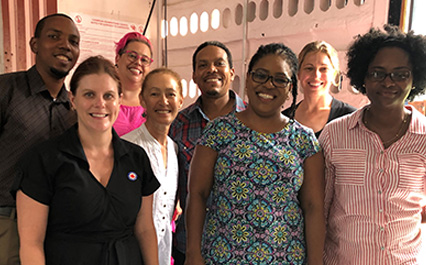
Canadian and Lucian facilitators including Monique Wilson from Edmonton (second from left) and Stephani Clements of Calgary (third from left).
The most rewarding professional development opportunities occur when we collaborate with colleagues and share best practices. Professional development opportunities such as the Canadian Teachers’ Federation’s Project Overseas enable Canadian teachers to volunteer and share their expertise while working with teachers in various partner countries.
During the month of July, I had the great pleasure of leading a team of Canadian teachers to St. Lucia to work together with local teachers in facilitating a 10-day workshop on various teaching strategies.
The participation of the 60 to 80 teachers from St. Lucia was voluntary, but these dedicated teachers chose to take the first few weeks of their summer vacation to attend workshops. Many of them travelled an hour or more each day, demonstrating a commitment to their students and their own professional growth. As with teachers the world over, they were concerned with reaching every student, working with finite resources and helping students achieve various goals.
While our focus was academic and professional (which made for busy planning and teaching days), there were several opportunities for cultural immersion. We were able to experience Carnival, visit the volcano and sulphur springs, dine at a local fish fry (the catch of the day was tuna or conch, locally known as lambi) and climb part way up the famous Gros Piton mountain just to try amazing homemade ice cream (lime and avocado flavour)! St. Lucia is an amazing country!
I would highly recommend Project Overseas to any teacher, especially one who is team oriented, adventurous, highly motivated, adaptable and desires a positive professional learning experience. Participation in Project Overseas is a life-changer!
Stephani Clements teaches in Calgary.
